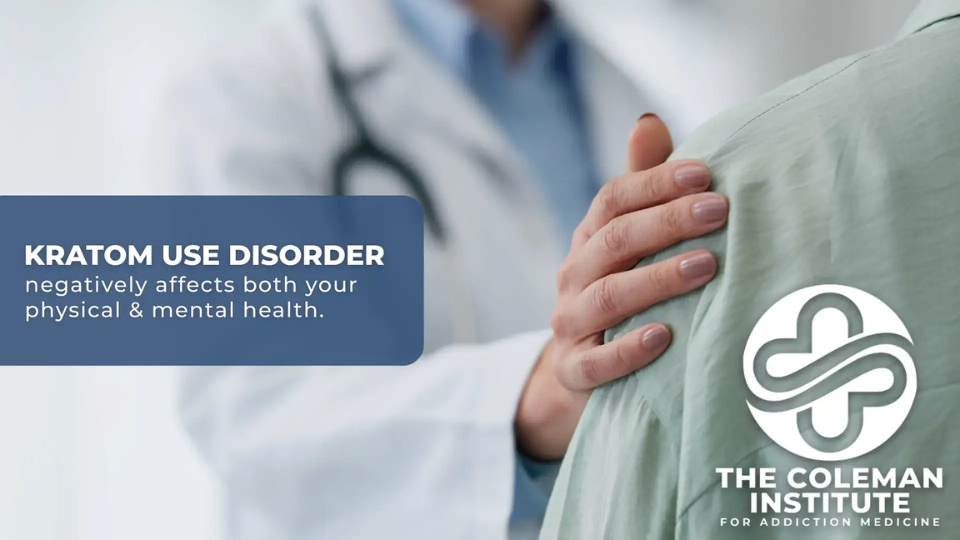Nano kratom has emerged as one of the latest forms of kratom on the market. This reformulated powder is promoted as a ‘more advanced’ version of traditional kratom, created using nanotechnology to increase absorption and deliver a faster onset of more intense effects.
Faster absorption means nano kratom can feel stronger and act more quickly than traditional kratom, but wears off sooner. Over time, its intensity can heighten the risk of opioid-like physical withdrawal or Kratom Use Disorder (KUD).
At The Coleman Institute for Addiction Medicine, we’ve seen a growing number of our patients struggling with dependence and withdrawal from concentrated kratom formulations, including nano kratom. Understanding how these reformulated products affect your or your loved one's brain is key to finding the best path to recovery.
How Does Nano Kratom Work?
Nano kratom is not a new strain or chemical compound; it’s a reformulated version of standard kratom powder that’s been processed into extremely small particles, often less than 100 nanometers in diameter. This increased absorption via nanotechnology enhances how the body absorbs kratom’s active alkaloids, mitragynine and 7-hydroxymitragynine.
While this process doesn’t change kratom’s chemistry, it alters how quickly the body responds. Faster absorption can make the effects feel stronger, increasing the likelihood of tolerance and dependence.
Kratom’s alkaloids, especially 7-hydroxymitragynine (7-OH), bind to opioid receptors in the brain, explaining the physical withdrawal symptoms many people experience after regular use.

Why Nano & Other Enhanced Kratom Products Are Riskier
These ‘ultra-enhanced’ nano kratom formulations deliver higher concentrations of kratom alkaloids than natural leaf powder. Because these forms are absorbed more efficiently, they act more strongly on the brain’s mu-opioid receptors, increasing the risk of dependence and withdrawal.
Other emerging derivatives, such as pseudoindoxyl (pseudo), may be even more potent due to their altered chemical structure. These synthetic variants can be especially difficult to stop using because of their strong opioid-like effects and prolonged activity in the body.
Although some manufacturers market nano kratom as a ‘cleaner high’ or ‘more effective’, what they’re really describing is its increased potency, and that also means increased risk. Because long-term safety data on nano-processed kratom is extremely limited, medically monitored detox remains the safest and most reliable option for stopping use.
Common Nano Kratom Withdrawal Symptoms
Withdrawal from nano kratom can vary depending on dose, frequency, and individual factors, but commonly includes:
- Intense cravings
- Anxiety & restlessness
- Muscle aches & body pain
- Fatigue or insomnia
- Irritability or mood swings
- Sweating & chills
- Nausea, vomiting, or diarrhea
- Runny nose & watery eyes
Because of its enhanced absorption and shorter high, nano kratom may cause stronger or faster-onset withdrawal than other standard kratom products.
Our Abstinence-Based Approach to Treatment
At The Coleman Institute, we use an abstinence-based approach to help people safely stop using kratom, including nano kratom, without relying on replacement medications like methadone or Suboxone.
The Coleman Institute’s Outpatient Kratom Detox program makes detox quicker, safer, more comfortable, and effective through the use of non-addictive comfort medications that ease withdrawal symptoms. Using our Accelerated Opioid Detox protocols, patients can complete detox in as few as five days, without the need for inpatient hospitalization.
This approach allows patients to begin recovery completely free from kratom and opioid-replacement therapies, establishing a solid foundation for long-term recovery.
Nano Kratom Myths versus Facts
| Myth | Fact |
| “Nano kratom is not addictive.” | Just like regular kratom, nano kratom is addictive. Kratom’s alkaloids activate the same brain receptors as opioids, which can cause physical dependence and withdrawal. |
| “Kratom products help people detox from opioids naturally.” | While some use kratom to manage opioid withdrawal, it usually leads to cross-dependence that requires medical detox. |
| “You don’t need medical help to stop using kratom products.” | Withdrawal can be extremely uncomfortable and destabilizing; professional medical detox services ensure safety and comfort. |
The Dangers of Detoxing Cold Turkey
Even though kratom is legal in many states, that doesn’t mean it’s safe to quit without help. Sudden discontinuation, especially from more potent forms like nano kratom, can cause significant withdrawal symptoms that increase the risk of relapse.
A supervised medical detox program provides structure, comfort, and accountability, helping patients begin recovery with professional clinical support.
Nationwide Outpatient Kratom Detox Locations
The Coleman Institute provides Accelerated Outpatient Detox programs at convenient locations across the United States, including:
Our experienced team of professionals has helped thousands of patients across the country safely detox from kratom and other addictive substances through compassionate, evidence-based care.
Break Free From Kratom Withdrawal Today
If you or someone you love is struggling with kratom products, you don’t have to face this alone. Call 888-705-9615 or schedule a callback to start your recovery journey from kratom today.


